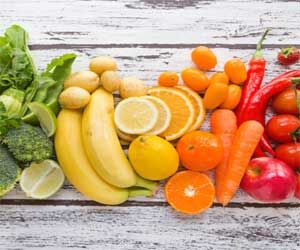- Home
- Medical news & Guidelines
- Anesthesiology
- Cardiology and CTVS
- Critical Care
- Dentistry
- Dermatology
- Diabetes and Endocrinology
- ENT
- Gastroenterology
- Medicine
- Nephrology
- Neurology
- Obstretics-Gynaecology
- Oncology
- Ophthalmology
- Orthopaedics
- Pediatrics-Neonatology
- Psychiatry
- Pulmonology
- Radiology
- Surgery
- Urology
- Laboratory Medicine
- Diet
- Nursing
- Paramedical
- Physiotherapy
- Health news
- Fact Check
- Bone Health Fact Check
- Brain Health Fact Check
- Cancer Related Fact Check
- Child Care Fact Check
- Dental and oral health fact check
- Diabetes and metabolic health fact check
- Diet and Nutrition Fact Check
- Eye and ENT Care Fact Check
- Fitness fact check
- Gut health fact check
- Heart health fact check
- Kidney health fact check
- Medical education fact check
- Men's health fact check
- Respiratory fact check
- Skin and hair care fact check
- Vaccine and Immunization fact check
- Women's health fact check
- AYUSH
- State News
- Andaman and Nicobar Islands
- Andhra Pradesh
- Arunachal Pradesh
- Assam
- Bihar
- Chandigarh
- Chattisgarh
- Dadra and Nagar Haveli
- Daman and Diu
- Delhi
- Goa
- Gujarat
- Haryana
- Himachal Pradesh
- Jammu & Kashmir
- Jharkhand
- Karnataka
- Kerala
- Ladakh
- Lakshadweep
- Madhya Pradesh
- Maharashtra
- Manipur
- Meghalaya
- Mizoram
- Nagaland
- Odisha
- Puducherry
- Punjab
- Rajasthan
- Sikkim
- Tamil Nadu
- Telangana
- Tripura
- Uttar Pradesh
- Uttrakhand
- West Bengal
- Medical Education
- Industry
Fruits and vegetable better than recommended therapy for managing CKD, finds study

Texas: Fruits and vegetables (F+V) provided more beneficial health outcomes in patients with chronic kidney disease (CKD) stage 3 in a cost-effective manner as compared to recommended sodium bicarbonate supplements, suggests a recent study in the Journal of Renal Nutrition. F+V or sodium bicarbonate supplements however produced comparable improvements in metabolic acidosis in these patients.
Current guideline recommends metabolic acidosis treatment in CKD patients with Na+-based alkali but base producing F+V might yield better and more health outcomes, making it a cost-effective intervention. Nimrit Goraya, Department of Internal Medicine, Baylor Scott and White Health, Temple, Texas, and colleagues, therefore, tested the hypothesis whether metabolic acidosis treatment in CKD with F + V yields ancillary health outcomes compared to standard recommended therapy with NaHCO3.
For the study, 108 macroalbuminuric, nondiabetic CKD stage 3 participants with metabolic acidosis patients were randomized to receive F + V (n = 36) calculated to reduce dietary acid by half, oral NaHCO3 (HCO3−, n = 36) 0.3 mEq/kg body weight/day, or Usual Care (UC, n = 36) assessed annually for 5 years. A mean overall health score were calculated in groups as follows: 1 for improved, 0 for no change, and −1 for worsened at 5 years for plasma total CO2, low-density lipoprotein cholesterol, high-density lipoprotein cholesterol, change in medication dose (reduction = 1, increased = −1, no change = 0), and 1 for met goal and 0 for not meeting the goal for estimated glomerular filtration rate (>30 mL/min/1.73 m2) and systolic blood pressure (<130 mm Hg).
The researchers also assessed the number of participants with cardiovascular disease events (myocardial infarctions + strokes) and group medication and hospitalization costs.
Key findings of the study include:
- Net plasma total CO2 increase at 5 years was no different between HCO3− and F + V.
- Average health scores at 5 years differed among groups with F + V (7.4 [mean] ± 1.6 [standard deviation]) being descriptively larger than HCO3− and UC (2.9 ± 1.6 and 1.2 ± 1.6, respectively).
- The number of participants suffering cardiovascular disease events differed among groups with none (0) in F + V, 6 in UC, and 2 in HCO3−.
- Total 5-year household cost per beneficial health outcome differed among groups with UC being highest and that for HCO3− and F + V being comparable.
"These studies show that dietary H+ reduction treatment of CKD-related metabolic acidosis with F + V and NaHCO3 yielded a comparable improvement of metabolic acidosis yet F + V yielded ancillary beneficial health benefits and did so cost-effectively," wrote the authors.
"The data support the need for follow-up studies to examine the apparently more comprehensive individual and population benefits of F + V in the growing CKD population, " they concluded.
The study, "Treatment of Chronic Kidney Disease-Related Metabolic Acidosis With Fruits and Vegetables Compared to NaHCO3 Yields More and Better Overall Health Outcomes and at Comparable Five-Year Cost," is published in the Journal of Renal Nutrition.
DOI: https://www.sciencedirect.com/science/article/pii/S1051227620302016
Dr Kamal Kant Kohli-MBBS, DTCD- a chest specialist with more than 30 years of practice and a flair for writing clinical articles, Dr Kamal Kant Kohli joined Medical Dialogues as a Chief Editor of Medical News. Besides writing articles, as an editor, he proofreads and verifies all the medical content published on Medical Dialogues including those coming from journals, studies,medical conferences,guidelines etc. Email: drkohli@medicaldialogues.in. Contact no. 011-43720751


